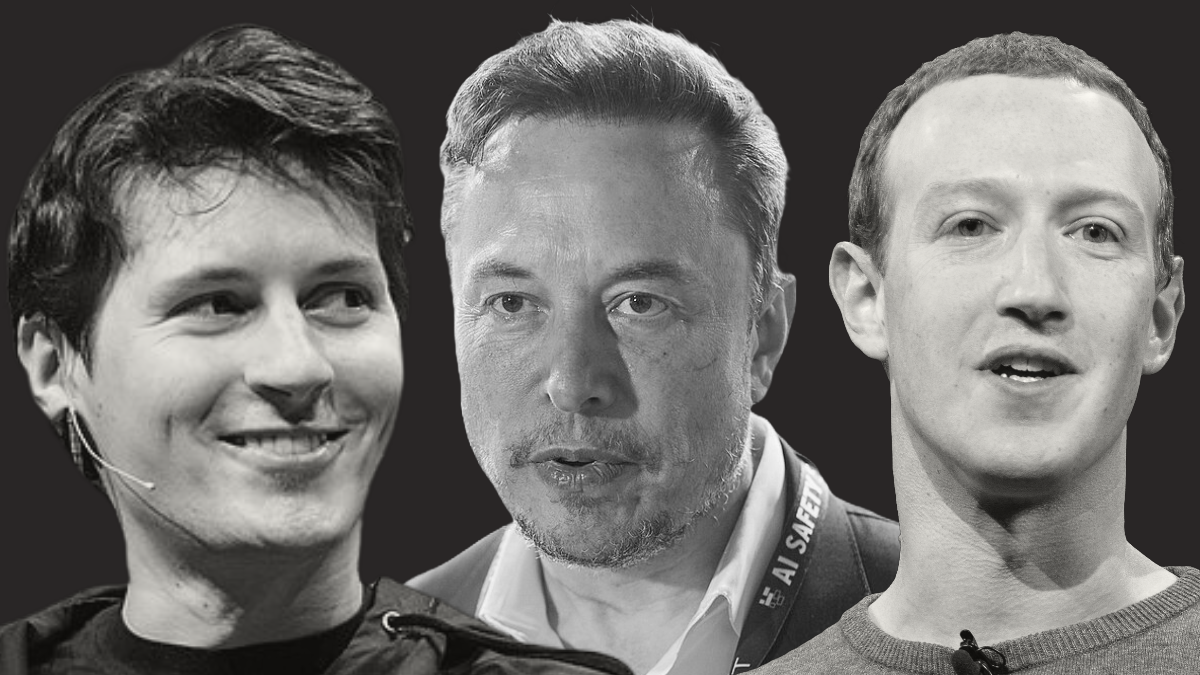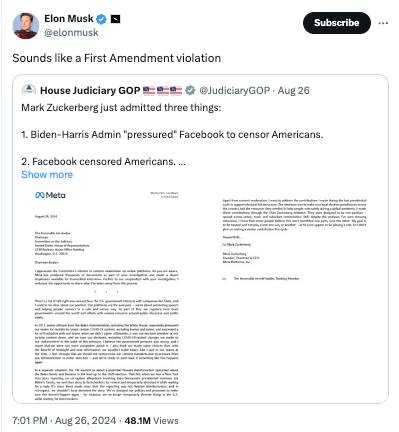Durov, Musk, and Zuckerberg: Tech Oligarchs Cry Censorship and What It All Means
Justin Hendrix / Aug 30, 2024This piece is co-published with Just Security.

Pavel Durov, cofounder and CEO of Telegram, left; Elon Musk, owner of X, center; Mark Zuckerberg, founder and CEO of Meta, right. Images via Wikimedia Commons.
If you happen to be someone who studies the relationship between tech oligarchs and state power, the past few days of news events have provided you with much to consider:
- On Saturday, French authorities detained Pavel Durov, the Russian-born billionaire who is cofounder and CEO of Telegram, as part of an investigation opened in July into the moderation of alleged criminal activity on the platform.
- On Monday, Meta founder and CEO Mark Zuckerberg sent a letter to House Judiciary Committee Chairman Jim Jordan (R-OH), in which Zuckerberg expressed regret about how his company responded to “repeated[] pressure” from the US government on COVID-19 content moderation.
- And on Wednesday, Brazil’s Supreme Court gave the billionaire Elon Musk 24 hours to name a legal representative for X in Brazil or face a ban of the platform in the country.
Beyond the simple fact that these stories represent three significant developments in billionaire operators of social media and messaging applications encountering elements of the state, these three touch points also signal how their commitment to the so-called “marketplace of ideas” may increasingly be tested, especially when it comes to hosting harmful content. These developments also show the extent to which these billionaires all employ the concept of “censorship” in different ways to defend themselves against claims regarding their business practices and content moderation decisions. In fashioning themselves as proponents of free speech, these oligarchs argue they must not be held to account by agents of democratically elected governments. Of course there is a line of government censorship that may well improperly intrude upon the companies, and by extension the rights of their users to communicate and receive information freely. So, what then might the week’s head-turning moments tell us about the future of the relationship between social media and democracy?
Cries of Censorship as Get-Out-Of-Jail Free Card
Of course, the circumstances are quite different in each case. One way to think of these men is on a spectrum when it comes to their rhetoric and the conduct of their companies regarding “free speech.”
- Telegram’s Durov is perhaps on the most extreme end of the spectrum, given the platform is widely understood to engage in next to no content moderation in its public channels. The French indictment says his behavior crossed various lines, including by permitting Telegram to trade in child pornography and doing business with organized criminals. His lawyers say the allegations against him are “absurd.” But even staunch defenders of laws that protect platform owners from liability are not convinced. Daphne Keller, director of the Program on Platform Regulation at the Stanford Cyber Policy Center, said in a post on LinkedIn that this may simply not be about speech. “I am usually one of the people making noise about free expression consequences when lawmakers go overboard regulating platforms. Possibly this will turn out to be one of those cases. But so far, I don't think so.” She explained, if “Telegram fails to remove things like unencrypted CSAM [child sexual abuse material] or accounts of legally designated terrorist organizations even when notified[, t]hat could make a platform liable in most legal systems, including ours.”
- Musk believes himself to be a free speech champion – a duplicitous assertion given, among other things, his prolific use of litigation to chill the speech of his critics. He has greatly reduced the barriers to a variety of forms of speech on X that were once considered violations of the platform’s policies, and has reinstated the accounts of various right-wing and white supremacist figures, moves which can’t be understood apart from his personal efforts to promote far-right politics around the world. His conduct in Brazil includes refusing to cooperate with an investigation of individuals who staged the riot in the seat of government in Brasilia in 2022. While the situation in Brazil is not clear cut, Musk is responsible for the trouble, at least according to UC Irvine law professor and former UN Special Rapporteur David Kaye. “Musk has only himself to blame for this mess, which will harm Brazilian[s] who still use X/Twitter for public discourse,” he wrote on the social media platform Bluesky.
- Zuckerberg, who oversees arguably the largest content moderation operation in the world outside of China, occupies a less radical position, even if he appears to be moving closer to the other two than he has been in recent years. His letter to Rep. Jordan this week indicates he regrets taking certain moderation decisions that were consistent with admonitions of the US government, even as he claims those decisions were his own. Zuckerberg’s missive amounts to a series of concessions to a Congressman who himself orchestrated a disinformation campaign intended to undermine the result of the 2020 US presidential election and has used his office in the intervening years to build the case that Republicans are the victims of state censorship. As TechDirt editor Mike Masnick pointed out, what Zuckerberg says in the letter “misleadingly plays into Jordan’s mendaciously misleading campaign.” Notably, Musk was also quick to embrace Zuckerberg’s letter under the banner of First Amendment rights.
Zuckerberg may believe that his letter will reset relations with Republicans as he sets a new standard for where he intends to draw the line when it comes to engaging with governments on issues of “public discourse and public safety.” And he may believe it will placate former President and 2024 Republican nominee Donald Trump, who according to Politico writes in a new book that Zuckerberg plotted against him in the 2020 election, in part through his philanthropic support for election infrastructure. Politico says Trump writes that Zuckerberg “would ‘spend the rest of his life in prison’ if he did it again.”
In all three of these instances, the oligarchs appear to believe they should have been the ones to set the rules, and that governments should back off. And in all three cases, free speech absolutists and far-right activists have cheered or defended the oligarchs, even if the underlying facts are not precisely in their favor. But these incidents, occurring so proximate to each other, suggest the fault lines between states and tech platforms are trembling. Who are the legitimate champions of democracy – the politicians and officials installed through elections, or the tech oligarchs who claim to defend free speech? What measures may even democratic governments not implement out of legitimate concerns for freedom of speech and the right to association?
The oligarchs have a vested interest in promoting the illusion of a marketplace of ideas. Politically, they can position themselves as champions of free speech, and use that position to defend against claims a government or a prosecutor might bring against them. But this power struggle is fraught with risks. Governments around the world are introducing a raft of new regulations meant to curb various harms associated with social media and messaging platforms. As these policies take shape, they may lead to even more confrontations with the oligarchs and social media platforms. This will have significant implications for free expression, particularly in regions where democracy is weak or nonexistent. Whether states prove effective at policing the platforms and the oligarchs who own and operate them will determine the balance of power between tech and democracies going forward. There are important lines to draw that respect free speech but guard against social harms. It is important for the heads of social media companies to demand fair and legitimate boundaries are set. The current strategy by some of them seems more like the tale of the boy who cried wolf.
Authors

